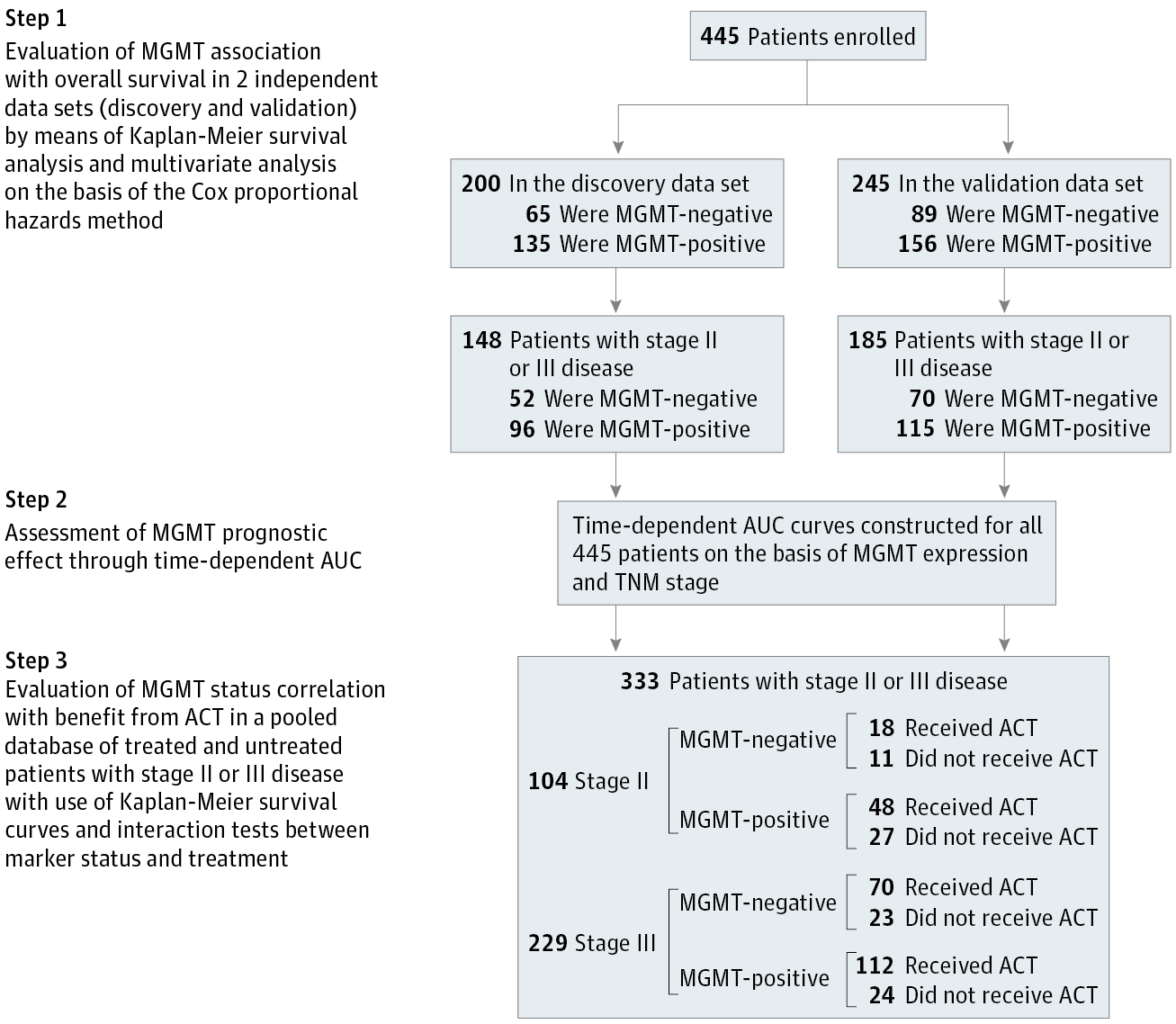当前位置:
X-MOL 学术
›
JAMA Surg.
›
论文详情
Our official English website, www.x-mol.net, welcomes your
feedback! (Note: you will need to create a separate account there.)
Association of O6-Methylguanine-DNA Methyltransferase Protein Expression With Postoperative Prognosis and Adjuvant Chemotherapeutic Benefits Among Patients With Stage II or III Gastric Cancer.
JAMA Surgery ( IF 15.7 ) Pub Date : 2017-11-15 , DOI: 10.1001/jamasurg.2017.3120 Yifan Cao 1 , Hao Liu 2 , He Li 2 , Chao Lin 2 , Ruochen Li 1 , Songyang Wu 1 , Heng Zhang 2 , Hongyong He 2 , Weijuan Zhang 3 , Jiejie Xu 1
JAMA Surgery ( IF 15.7 ) Pub Date : 2017-11-15 , DOI: 10.1001/jamasurg.2017.3120 Yifan Cao 1 , Hao Liu 2 , He Li 2 , Chao Lin 2 , Ruochen Li 1 , Songyang Wu 1 , Heng Zhang 2 , Hongyong He 2 , Weijuan Zhang 3 , Jiejie Xu 1
Affiliation

|
Importance
Loss of O6-methylguanine-DNA methyltransferase (MGMT) protein expression has been reported in several malignant tumors and predicts dismal survival outcomes. In gastric cancer, existing studies on this topic are limited and the association between MGMT and fluorouracil-based adjuvant chemotherapy remains obscure.
Objective
To investigate the postoperative prognostic significance of MGMT in patients with resectable gastric cancer and its responsiveness to fluorouracil-based adjuvant chemotherapy.
Design, Setting, and Participants
This study recruited 445 consecutive patients with resectable gastric cancer who underwent radical gastrectomy between August 1, 2007, and December 30, 2008, at Zhongshan Hospital at Fudan University in Shanghai, China. Patients were randomly divided into a discovery data set (n = 200) and a validation data set (n = 245), and the range of follow-up time was from 2 to 76 months for the discovery group and 2 to 79 months for the validation group. The immunoreactivity for MGMT in cancer cells was reviewed under a light microscope by 2 pathologists who were blinded to the clinicopathological data. The association of MGMT expression with clinicopathological characteristics and measures and prognosis was inspected. Data and specimens were collected from patients from the date of surgery to April 25, 2014. Data analysis took place from May 9, 2016, to July 15, 2016.
Main Outcomes and Measures
Estimates of overall survival on the basis of MGMT expression and hazard ratio (HR) for estimates of overall mortality risk.
Results
Of the 445 patients included in the study, 315 (70.8%) were men, and the mean (SD) age of all patients was 60 (12) years. Positive expression of MGMT indicated better overall survival for patients with stage II or III gastric cancer in both the discovery data set (HR, 0.52; 95% CI, 0.32-0.84; P = .003) and the validation data set (HR, 0.63; 95% CI, 0.43-0.93; P = .01). Multivariate analysis identified MGMT expression and TNM stage as 2 independent prognostic factors for overall survival. In stage II disease, the benefit from fluorouracil-based adjuvant chemotherapy was superior among MGMT-positive patients (HR, 0.35; 95% CI, 0.13-0.95; P = .007 for interaction) compared with MGMT-negative patients.
Conclusions and Relevance
Positive expression of MGMT in gastric cancer was identified as an independent, favorable prognostic factor. Incorporating MGMT expression into the current TNM staging system could lead to better prognostic accuracy. These findings should be confirmed within the framework of randomized clinical trials associated with genomic DNA sequencing studies.
更新日期:2017-12-15













































 京公网安备 11010802027423号
京公网安备 11010802027423号